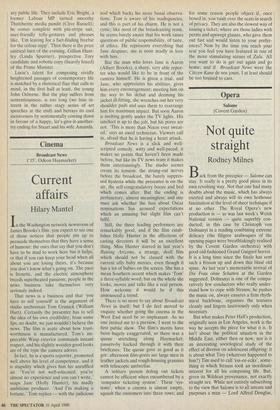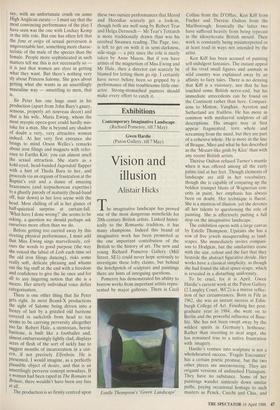Opera
Salome (Covent Garden)
Not quite straight
Rodney Milnes
Back from the precipice — Salome can stay. It really is a pretty good piece in its own revolting way. Not that one had many doubts about the music, which has always exerted and always will its own hothouse fascination at the level of sheer technique if at no other. The Royal Opera's new production is — as was last week's Welsh National version — quite superbly con- ducted, in this case by Christoph von Dohnanyi in a reading combining extreme delicacy (the filigree arabesques of the opening pages were breathtakingly realised by the Covent Garden orchestra) with good old-fashioned Grand Guignol horror. It is a long time since the finale has sent such a frisson up and down this blasé old spine. As last year's memorable revival of Die Frau ohne Schatten at the Garden suggested, Dohnanyi is one of the compa- ratively few conductors who really under- stand how to cope with Strauss; he pushes the music on, always ensures a firm rhyth- mical backbone, organises the textures cleanly and lingers lasciviously only when necessary.
But what makes Peter Hall's production, originally seen in Los Angeles, work is the way he accepts the piece for what it is. It isn't about the political situatinn in the Middle East, either then or now, nor is it an interesting sociological study of the effect of divorce on adolescent offspring: it is about what Tiny (whatever happened to him?) Tim used to call 'ess-ee-ecks', some- thing in which Strauss took an inordinate interest for all his composing life. But, given its Wildean provenance, not exactly straight sex. While not entirely subscribing to the view that Salome is to all intents and purposes a man — Lord Alfred Douglas,
say, with an unfortunate crush on some High Anglican curate — I must say that the most convincing performance of the play I have seen was the one with Lindsay Kemp in the title role. But one has often felt that the fons et origo of sexual perversion is ungovernable lust, something more charac- teristic of the male of the species than the female. People more sophisticated in such matters tell me this is not necessarily so it is just that women are slyer in getting what they want. But there's nothing very sly about Princess Salome. She goes about getting what she wants in an unsettlingly masculine way — unsettling to men, that is.
Sir Peter has one huge asset in his production (apart from John Bury's gauzy, sensous, properly art nouveau decor) and that is his wife, Maria Ewing, whom the most myopic opera-goer could hardly mis- take for a man. She is beyond any shadow of doubt a very, very attractive woman indeed. At her very first entrance she brings to mind Orson Welles's remarks about iron filings and magnets with refer- ence to Eartha Kitt: you can almost smell the sexual attraction. She starts as a kohl-eyed, head-banded Jugendstil flapper with a hint of Theda Bara to her, and proceeds via an orgasm of frustration at the Baptist's exit and a dance of amazing brazenness (and terpsichorean expertise) to a ghastly parody of maturity (head-band off, hair down) in her love scene with the head. Most chilling of all is her glance of half-quizzical surprise at curtain-fall. 'What have I done wrong?' she seems to be asking, a question we should perhaps ask ourselves more often than we do.
Before getting too carried away by this riveting physical performance, I must add that Miss Ewing sings marvellously, col- ours the words to good purpose (the way she voiced the labial of Leib each time set the old iron filings dancing), risks some really soft, delicate phrasing and whams out the big stuff at the end with a freedom and confidence to give the lie once and for all to any lingering notion that she is a mezzo. Her utterly individual voice defies categorisation.
There is one other thing that Sir Peter gets right. In most Brand-X productions the sight of Salome being driven into a frenzy of lust by a grizzled old baritone covered in sackcloth from head to toe seems to be carrying perversity altogether too far. Robert Hale, a stentorian, heroic baritone, is built like a footballer and, almost embarrassingly lightly clad, displays acres of flesh of the sort of sickly hue to suggest months of incarceration in a cist- ern, if not precisely Elfenbein. He is presented, I would imagine, as a perfectly plausible object of desire, and that is an unsettlingly perverse concept nowadays. If a woman had been raped in The Romans in Britain, there wouldn't have been any fuss at all.
The production is so firmly centred upon these two outsize performances that Herod and Herodias scarcely get a look-in, though both are well sung by Robert Tear and Helga Dernesch — Mr Tear's Tetrarch is more traditionally drawn than was his cerebral Swansea reading. The Page, too, is left to get on with it in semi-darkness, side-stage — a pity since the role is nicely taken by Anne Mason. But if you have artists of the magnetism of Miss Ewing and Mr Hale, then a director can scarcely be blamed for letting them go rip. I certainly have never before been so gripped by a performance of this troublesome little one- actor. Strong-stomached punters should make every effort to catch it.































































 Previous page
Previous page